Can You Wash Dishes in Dishwasher With Bleach
How to Sanitize Dishes with Bleach
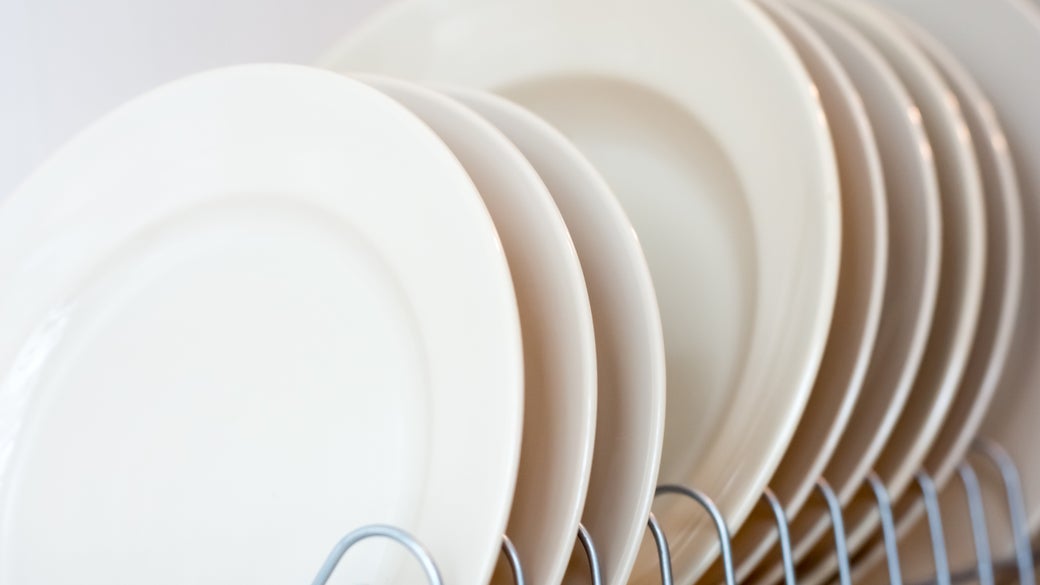
Manus washing dishes may eliminate visible food and dirt, merely information technology's non enough to kill bacteria like salmonella. To sanitize, you can rinse your dishes with a bleach and water solution after washing.
Bacteria on dishes tin can make yous sick
Nutrient poisoning — stomach cramps, diarrhea, and worse—can exist caused by unsafe leaner on the items we utilise to swallow, potable and melt with. Harmful bacteria can as well make the nutrient we eat and drinkable taste off.
And information technology's not just a problem for dishes and glassware; it's really obvious in an insulated water bottle or java tumbler, and even stainless steel reusable straws. Fortunately, it's also like shooting fish in a barrel to fix!
Safely wash dishes with bleach
If yous don't have an automated dishwasher, and wash all your dishes by hand, adding in a routine sanitizing step after washing and rinsing is pretty like shooting fish in a barrel to do. Or mayhap you do have a dishwasher, and simply hand wash items that aren't dishwasher safe.
Either manner, always be certain to measure the correct amounts of bleach and water to brand the sanitizing solution.
| Container | Amount of Water | Amount of Bleach |
|---|---|---|
| Large sink | 3 gallons | 2 tablespoons |
| Large dishpan | 2 gallons | 1 tbsp + 1 tsp |
| Modest dishpan | 1 gallon | 2 teaspoons |
| 32 oz. water canteen | Fill with h2o | ½ teaspoon |
| 24 oz. coffee tumbler | Fill up with water | ¼ + ⅛ tsp |
| 16 oz. water canteen | Fill with water | ¼ teaspoon |
Related articles
Sanitizing dishes is simple
- Launder the dishes with dish detergent.
- Rinse the dishes with clean water.
- Soak the dishes for 2 minutes in a 185ppm available chlorine bleach and h2o colution.
- Bleed or drip dry out. No additional rinsing is required!
You can mix up the bleach and h2o solution in a larger container or sink. This makes it easier to sanitize a large number of items. Or if yous but demand to sanitize ane particular, you can sometimes treat the item itself.
For coffee tumblers or any other detail with a chapeau, be certain to sanitize the chapeau, too. If necessary, detach the chapeau to thoroughly sanitize all the pieces.
Tip
Don't wash non-stainless steel, aluminum, silverish or chipped enamel with bleach. Disinfect these past scalding.
Assemble your supplies
-

Clorox® Disinfecting Bleach
-
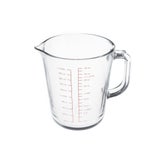
-
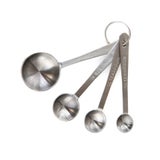
-
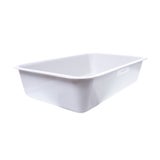
Plastic dishpans
You'll demand 3
-
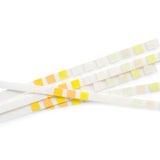
-
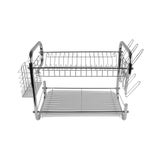
Steps to sanitize your dishes
-
one
Wash your dishes
Use hot water and dish detergent. Employ your sink or a dishpan depending on the corporeality of dishes you want to launder and make full it with hot soapy water, then wash the dishes. As yous work, transfer the washed dishes to a second dishpan or the other half of your sink filled with make clean water.
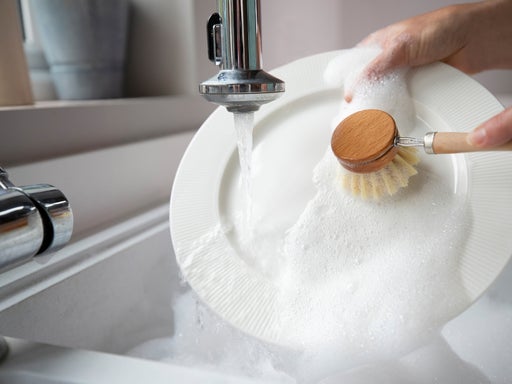
-
two
Rinse the dishes
Drib the soapy dishes into the rinse water. They can stay there while you mix up the bleach and water solution.
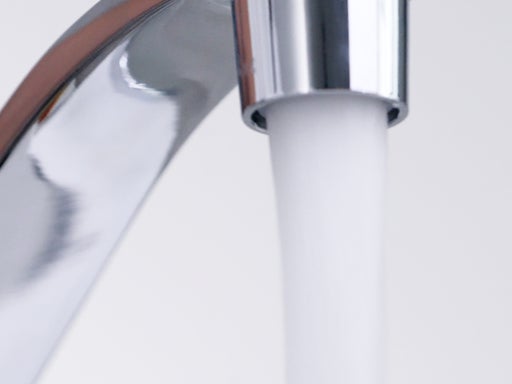
-
3
Ready the bleach and water solution
To mix upward the correct sanitizing solution, use the table earlier in this article to determine how much bleach and water to add for your situation. Use absurd tap water. You can use a third dishpan, or clean out your sink and utilize information technology to mix upwardly the bleach and h2o solution.
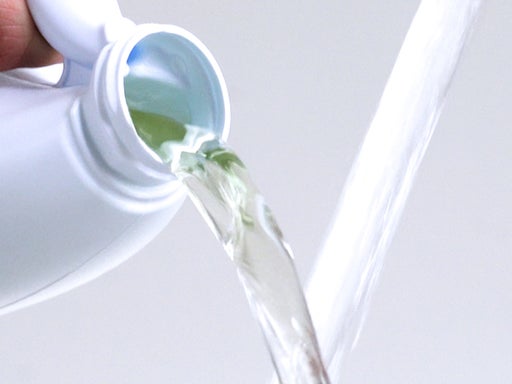
-
4
Confirm the bleach solution concentration
Use a chlorine examination strip to confirm you accept the correct concentration of sanitizing solution, 185ppm available chlorine. If the level is too low, carefully add together a pocket-sized corporeality of bleach and re-test with a fresh exam strip.
If you're sanitizing a large number of items, periodically re-examination the sanitizing solution to brand sure you maintain the correct level of bleach active. If necessary, add together a small amount of bleach when needed when the bleach active level falls below 185ppm.
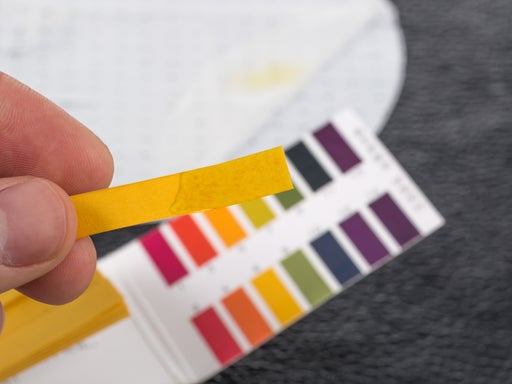
-
5
Sanitize the dishes
Submerge the dishes in the bleach and h2o solution, allowing them to soak for ii minutes.
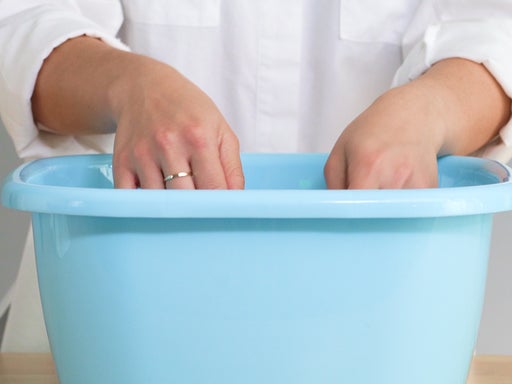
-
half-dozen
Permit the dishes drip or air dry out
Remove the dishes from the sanitizing solution and transfer them to the drying rack to air dry out. You don't demand to rinse them when you lot take them out of the bleach and h2o solution — no rinsing is required later the sanitizing step.
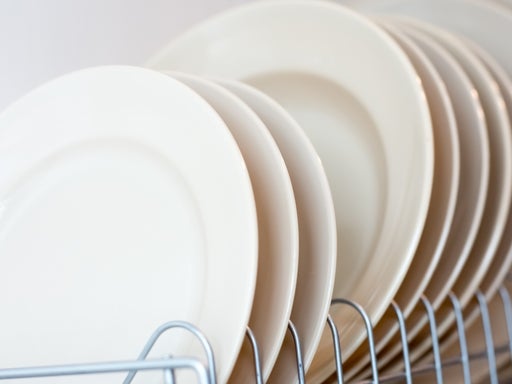
Frequently asked questions
- Do I need to apply tap water for sanitizing dishes?
-
Yes, only use potable water. This application is non the same as what we recommend to make h2o safe to drink in an emergency.
- Why can't I just add the bleach to the sudsy water?
-
The washing, rinsing, and sanitizing steps must all be done separately. That's because bleach breaks down very rapidly in the presence of organic thing. So the organics coming off your dishes would very chop-chop degrade the bleach if they were together in the same solution, and y'all would no longer take the right concentration of bleach to kill the bacteria.
- Tin can I utilise splashless bleach to sanitize dishes?
-
No — fifty-fifty though Clorox® Splash-Less® Bleach is at present EPA-registered, sanitizing dishes and other food contact surfaces is not an approved use on the EPA registration.
- Can I put bleach in my dishwasher with my dishes?
-
Regular bleach is non intended for use by itself in a household dishwasher. Instead, wait for Automated Dishwashing Detergents that already contain bleach. Commercial dishwashers (similar what y'all'd run into in a restaurant or other institution) do allow for bleach use depending on the model. Check the education manual or ask a service technician for guidance on proper use.
- I bought my bleach at warehouse store and information technology has a different name. Can I apply it instead?
-
Yes. Depending on where you buy your bleach, yous could also use whatever of the following: Clorox® Bleach1, Clorox® Regular Bleachiii, Clorox® Functioning Bleach2 and Clorox® Germicidal Bleach4.
Source: https://www.clorox.com/learn/how-to-sanitize-dishes-with-bleach/
0 Response to "Can You Wash Dishes in Dishwasher With Bleach"
Post a Comment